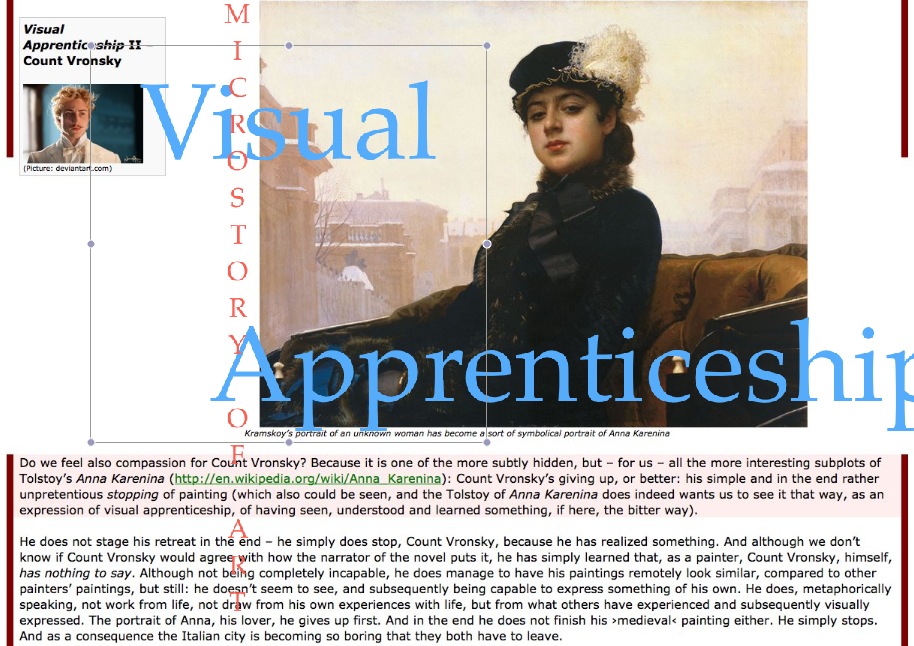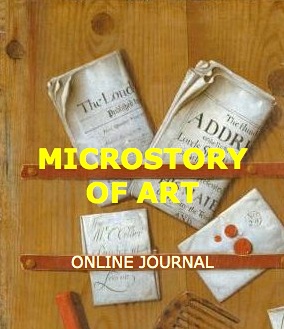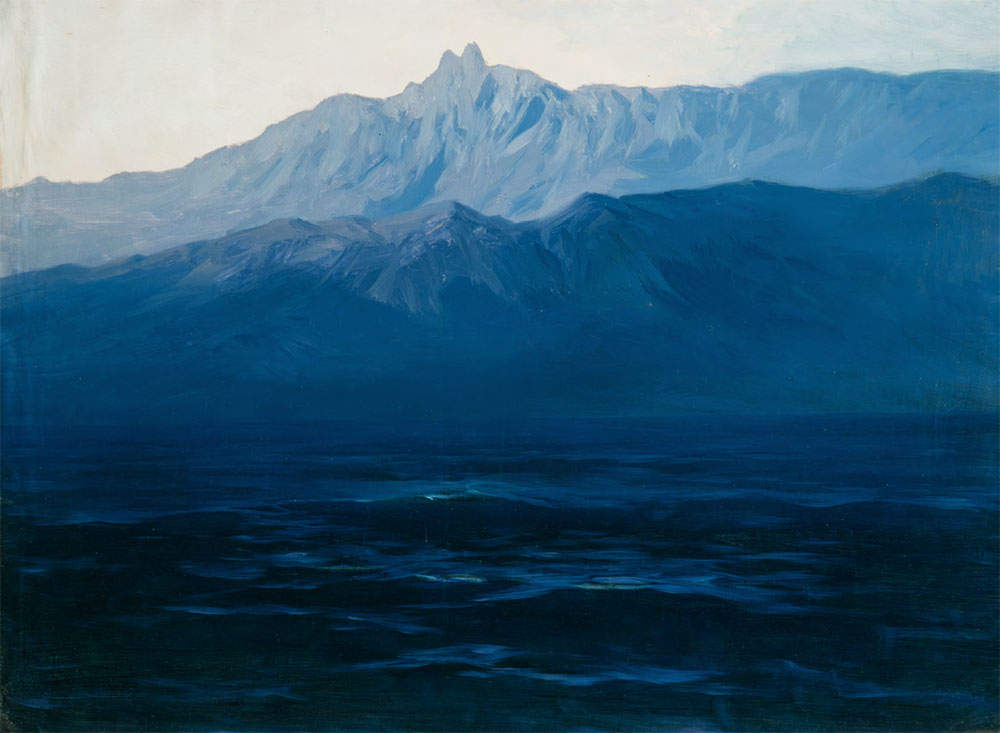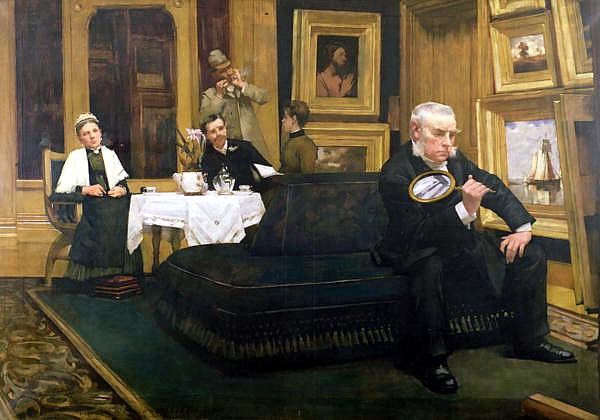M
I
C
R
O
S
T
O
R
Y
O
F
A
R
T
........................................................

NOW COMPLETED:

........................................................
MICROSTORY OF ART
ONLINE JOURNAL FOR ART, CONNOISSEURSHIP
AND CULTURAL JOURNALISM
........................................................
INDEX | PINBOARD | MICROSTORIES |
FEATURES | SPECIAL EDITIONS |
HISTORY AND THEORY OF ATTRIBUTION |
ETHNOGRAPHY OF CONNOISSEURSHIP |
SEARCH

........................................................



 >MICROSTORIES
>MICROSTORIES
- Richard Serra
- Martin Scorsese
- Claude Simon
- Sunshine
- Werner Herzog
- The Creation
- Marcel Duchamp
- Nino Rota
- Wölfflin and Woolf
- Hansjörg Schneider
- Kraftort Arkadien
- Visual Biography
- Schlaraffenleben
- Die Geisteswissenschaften
- The Voyeur
- Buzzword Sustainability
- Paul Verlaine
- Tao Yuanming
- New Beginning
- Seneca
- Still Lifes
- Charles Baudelaire
- Frédéric Chopin
- The Art History of Sustainability
- Wang Wei
- Solarpunk
- Historians of Light
- Lepanto
- Renaturalization
- Plates
- Snow in Provence
- Learning to See
- Picasso Dictionaries
- Peach Blossom Spring
- Picasso Tourism
- Tipping Points
- Sviatoslav Richter
- Weather Reports
- Treasure Hunt
- Another Snowscape in Picasso
- Picasso in 2023
- Dragon Veins
- The Gloomy Day
- The Art of the Pentimento
- Reforestation
- The Status of Painting
- Emergency Supply
- Punctuality
- Watching Traffic
- Zhong Kui
- How Painting Survived the 1990s
- Confirmation Bias
- Sustainability and Luxury
- Garage Bands
- Picasso and Artificial Intelligence
- Eyes of Tomorrow
- Picasso in 2023 2
- Gluing Oneself to Something
- Suburbia
- Bamboo
- Sustainability and Carpe Diem 1
- Interviews with Bruegel
- Sustainability and Carpe Diem 2
- Coffee & Sugar
- Bamboo 2
- Picasso in 2023 3
- Sustainability and Carpe Diem 3
- Cherry Orchard
- Old Magazines
- Chance
- Nick Drake
- Harlequin
- The Smartphone & the Art Book
- Atlas Syndrome
- The Kitchen
- Atlas Syndrome 2
- Consideration
- Tori Amos
- School
- Orchard Auctioning Day
- The Hundred Years’ War
- Sócrates
- Chameleon
- Nefertiti Bust
- Picasso as a Computer
- Sunflowers
- Philemon & Baucis
- Ode to the Radio
- Childhood
- Wimmelbild
- Restitution
- Nick Drake 2
- Wishful Thinking
- Sundays
- The Independent Scholar
- September
- The Fisherman by Pirosmani
- Microadventure
- Sociology
- Salvator Mundi
- Chillon
- Appassionata
- Amber
- Homer
- Berlin
- Planet Walk
- Improvisation
- Seeing Picasso
- These Nice Kids
- Robber
- The One
- The Sea Turtle
- Zoo
- Through the Hush
- Wunderkammer
- I Do Not Seek, I Find
- Shopping Mall
- Food Hamper
- The Secretary
- This Gate
- Nor Rainy Day
- House on a Hill
- Beautiful Island
- Second-hand Bookstore
- Flat
- Slap in the Face
- Serra, Wenkenpark
- Apologies
- The Bells
- Nordmann Fir
- Picasso Wanting To Be Poor
- Picasso, Pirosmani
- A Brief History of Sculpture
- 24 Sunsets
- Rusty Phoenix
- Glove
- Wintry Stanza
- A Song
- Like A Beatle
- Catching An Orange
- Solar Bees
- Permaculture

 >FEATURES
>FEATURES
- Van Gogh On Connoisseurship
- Two Museum’s Men
- Ende Pintrix and the City in Flames
- Titian, Leonardo and the Blue Hour
- The Man with the Golden Helmet: a documentation
- Un Jury d’admission à l’expertise
- Learning to See in Hitler’s Munich
- Leonardo da Vinci and Switzerland
- The Blue Hour Continued
- The Blue Hour in Louis Malle
- Kafka in the Blue Hour
- Blue Matisse
- Blue Hours of Hamburg and LA
- A Brief History of the Cranberry
- The Other Liberale in the House
- The Blue Hour in Raphael
- Who Did Invent the Blue Hour?
- Monet on Sustainability
- Velázquez and Sustainability
- The Blue Hour in Guillaume Apollinaire
- Van Gogh on Sustainability
- The Blue Hour in Marcel Proust
- Picasso and Sustainability
- The Contemporary Blue Hour
- The Blue Hour in 1492
- The Blue Hour in Hopper and Rothko
- Hopper and Sustainability
- The Blue Hour in Ecotopia
- The Hour Blue in Joan Mitchell
- Explaining the Twilight
- The Twilight of Thaw
- The Blue Hour in Pierre Bonnard
- Explaining the Twilight 2
- Picasso on Stalin
- Rubens on Sustainability
- The Salvator Mundi in Bruegel and Rubens
- The Blue Hour in Leonardo da Vinci and Poussin
- The Blue Hour in Rimbaud
- Faking the Dawn
- Frost and Thaw in Ilya Ehrenburg
- Picasso, Stalin, Beria
- Picasso, Solzhenitsyn and the Gulag
- Shostakovich on Picasso
- Hélène Parmelin in 1956
- Historians of Picasso Blue
- Picasso Travelling to Moscow 1
- The Blue Hour in Caravaggio
- Picasso Travelling to Moscow 2
- Picasso, the Knife Game and the Unsettling in Art
- Some Notes on Leonardo da Vinci and Slavery
- Picasso Moving to the Swiss Goldcoast
- The Blue Hour in Camus
- The Blue Hour in Symbolism and Surrealism
- Caspar David Friedrich in His Element
- Exhibiting the Northern Light
- Caspar David Friedrich in His Element 2
- Robert Schumann and the History of the Nocturne
- The Blue Hour in Robert Schumann
- Caspar David Friedrich and Sustainability
- The Twilight of Thaw 2
- Multicultural Twilight
- The Blue Hour in Anton Chekhov
- The Blue Hour in Medieval Art
- Twilight Photography
- The Blue Hour in Bob Dylan
- Iconography of Optimism

 >SPECIAL EDITIONS
>SPECIAL EDITIONS
- Visions of Cosmopolis
- Mona Lisa Landscapes
- Turner and Ruskin at Rheinfelden
- Painters On TV & On TV
- Spazzacamini in Art
- A Last Glance at Le Jardin de Daubigny
- The Experimental Cicerone
- A Dictionary of Imaginary Art Historical Works
- Iconography of Blogging
- Begegnung auf dem Münsterplatz
- Cecom
- Das Projekt Visual Apprenticeship
- Those Who See More
- A Fox on Seeing with the Heart
- Sammlung Werner Weisbach
- Daubigny Revisited
- Some Salvator Mundi Microstories
- Some Salvator Mundi Afterthougths
- Some Salvator Mundi Variations
- Some Salvator Mundi Revisions
- A Salvator Mundi Questionnaire
- A Salvator Mundi Puzzle
- Unknown Melzi
- Francis I and the Crown of Charlemagne
- From Amboise to Fontainebleau
- Drones Above Chambord
- Looking Back At Conques
- Flaubert At Fontainebleau
- Images of Imperial Ideology
- The Chronicles of Santa Maria delle Grazie
- Seeing Right Through Someone
- Melzi the Secretary
- Eying Glass
- A Foil to the Mona Lisa
- A Renaissance of the Cartoon
- Sketching a Family Tree
- Venetian Variations
- A Brief History of Digital Restoring
- A Consortium of Painters
- Leonardeschi and Landscape
- A Christ in Profile
- Learning to See in Spanish Milan
- A History of Gestures
- Leonardo and Josquin
- A Renaissance of the Hybrid
- Suida and Heydenreich
- The Watershed
- Three Veils
- From Beginning to End
- Connoisseurship of AI
- Twilight and Enlightenment
- The Blue Hour in Chinese Painting
- Dusk and Dawn at La Californie
- Iconography of Sustainability
- The Blue Hour in Goethe and Stendhal
- The Sky in Verlaine
- The Blue Hour in Paul Klee
- Iconography of Sustainability 2
- The Blue Hour in Charles Baudelaire
- From Bruegel to Solarpunk
- Some Salvator Mundi Documentaries
- Some More Salvator Mundi Monkey Business
- The Windsor Sleeve
- Brigitte Bardot’s Encounter with Picasso
- Art Historians and Historians
- A Salvator Mundi Chronicle
- The Salvator Mundi and the French Revolution
- The Fontainebleau Group
- The Encounter of Harry Truman with Pablo Picasso
- The Fontainebleau Group Continued
- The Windsor Sleeve Continued
- The Salvator Mundi in Early Netherlandish Painting 1
- Some Salvator Mundi Resources
- A New Salvator Mundi Questionnaire
- The Woman in Picasso
- The Yarborough Group
- Melzi, Figino and the Mona Lisa
- The Yarborough Group Continued
- A Salvator Mundi Global History
- The Salvator Mundi in Medieval Art
- The Salvator Mundi in Medieval Art 2
- The Salvator Mundi in Early Netherlandish Painting 2


 >HISTORY AND THEORY OF ATTRIBUTION
>HISTORY AND THEORY OF ATTRIBUTION
- The Mysterious »Donna Laura Minghetti-Leonardo«
- Assorted Demons of Connoisseurship
- Panofsky Meets Morelli
- Discovering the Eye of Sherlock Holmes
- Handling the Left-handed Hatchings Argument
- Visual History of Connoisseurship
- Alexander Perrig
- Connoisseurship in 2666
- What Postmodernity Has Done to Connoisseurship
- Dividing Four Fab Hands
- A Leonardesque Ambassador
- Test Cases in Connoisseurship
- A Raphael Expertise
- How to Tell Titian from Giorgione
- Louise Richter
- The Unique Property in the History of Connoisseurship
- An Expertise by Berenson
- The Book of Expertises
- An Album of Expertises
- An Expertise by Friedländer
- A Salvator Mundi Provenance
- How to Tell Leonardo from Luini
- An Expertise by Crowe and Cavalcaselle
- An Expertise by Bayersdorfer
- An Expertise by Hermann Voss
- An Expertise by Hofstede de Groot
- Leonardeschi Gold Rush
- An Unknown »Vermeer«
- An Expertise by Roberto Longhi
- An Expertise by Federico Zeri
- A Salvator Mundi Geography
- A Salvator Mundi Atlas
- The Bias of Superficiality
- 32 Ways of Looking at a Puzzle
- James Cahill versus Zhang Daqian
- Five Fallacies in Attribution
- On Why Art History Cannot Be Outsourced to Art Dealers
- On Why Artificial Intelligence Has No Place in Connoisseurship
- Salvator Mundi Scholarship in 2016
- Leonardo da Vinci at the Courts
- The Story of the Lost Axe
- The Last Bruegel
- A Titian Questionnaire
- On Where and Why the Salvator Mundi Authentication Did Fail
- The Problem of Deattribution

 >ETHNOGRAPHY OF CONNOISSEURSHIP
>ETHNOGRAPHY OF CONNOISSEURSHIP
MICROSTORY OF ART
ONLINE JOURNAL FOR ART, CONNOISSEURSHIP
AND CULTURAL JOURNALISM
........................................................

***
ARCHIVE AND FURTHER PROJECTS

1) PRINT


***
2) E-PRODUCTIONS


........................................................

........................................................

........................................................
FORTHCOMING:


***
3) VARIA

........................................................

........................................................

........................................................

........................................................

........................................................
***
THE GIOVANNI MORELLI MONOGRAPH

- The Giovanni Morelli Monograph
........................................................
MICROSTORY OF ART
ONLINE JOURNAL FOR ART, CONNOISSEURSHIP AND CULTURAL JOURNALISM
HOME
| MICROSTORY OF ART ONLINE JOURNAL FOR ART, CONNOISSEURSHIP AND CULTURAL JOURNALISM  Op-ed: How Elitist Is Connoisseurship? – Some Notes [++++Something inspiring a reflection on eliticism can, of course, be something elitist. But. In that it is inspiring such a reflection it also might bear the grain of democratization and growing participation, and more than that, more than of having more people taking part in it, a questioning about what might be elitist in a good sense (we all need teachers that know more than we do, we all need ambitions, we all need aims) and what might be elitist in a less desirable way. * [++++I recall having seen a man on TV, it must have been during the 1980s, an somewhat awkward and shy man who, yet, knew all the streets of Berlin. This was the reason why the man was on TV, to show (and to prove this to the audience) that he knew all the streets of Berlin. And he knew all the streets of Berlin because he had walked all of them. – Is this something elitist? Elitist in a good way? Or in a less desirable way? * [++++Children have a feel what it means to know something well. Teenagers have a feel what it means to know something well. And the seed for being a Bob Dylan connoisseur must probably have been planted into the Bob Dylan connoisseur while growing up. Children get a feel what it means to know something well for example by playing Memory. They know the map, the hidden map of pieces, and they learn fast, and by learning, if you are child or adult, you get a sense what it means to know something, to know something better, and to know something as if you were the world leading expert as to that something – an expert, a connoisseur. * [++++The negative connotation of ›elitist‹ is due, not to the knowing, but due to the factor of power. The power of having the right to define what it is worth knowing (seeing, experiencing, possessing), and the power to exclude others to know something equally well. This is eliticism in a bad way. And the excluding of people of knowing something well is not only due to the excluding people from the processes of acquiring that knowledge, but also from excluding them from the objects that would allow them to acquire that knowledge (given that they have time) all by themselves. * [++++Connoisseurship is associated conventionally with objects being precious and rare. Luxurious things. But these are conventions of thought. What if we think of connoisseurship not wanting to own these things but only to know them? Cultural things, natural things, human ways. Whatever. The stars of the universe (not, that is beyond our reach). What if we think connoisseurship of being also a field to question what is conventionally thought as being precious and worth knowing (if not speaking of having). Thus also to discuss the reasons why something is being considered as worth knowing (and why somebody is considered as a connoisseur, and expert, a world leading authority, a lumen)? And what if we think connoisseurship being a field to reflect upon what is being thought as knowing at all, knowing something well, better and best (without excluding anyone from that relation to things that is the result of really knowing something, knowing the differences, but still being aware that what one needs is time, and for having time, resources). This is what we imagine as connoisseurship in a good way. If this is elitist, we might claim that this is eliticism in a good way (and if merely to think about something is yet elitist, be it elitist). Staying aware that it must not be exclusive (and that negative uses of power have, let’s stay realistic, always been part of connoisseurship). But staying aware also that connoisseurship is not necessarily bound to possessing things and to possessing social distinction and therefore social capital (on the contrary: we may think of connoisseurship dismissing all that as vain, because in the end it is about the relation to things, to life). And finally staying aware that what one needs is the most precious of all resources: given that there is curiosity, given that there is absence of all destructive forces that threaten life – all one needs is time (and the power to organize it well, to spare it). |
(Picture: DS)
MICROSTORY OF ART
ONLINE JOURNAL FOR ART, CONNOISSEURSHIP AND CULTURAL JOURNALISM
HOME
Dietrich Seybold Homepage (with publishing informations as to the Microstory of Art Online Journal)
© DS
